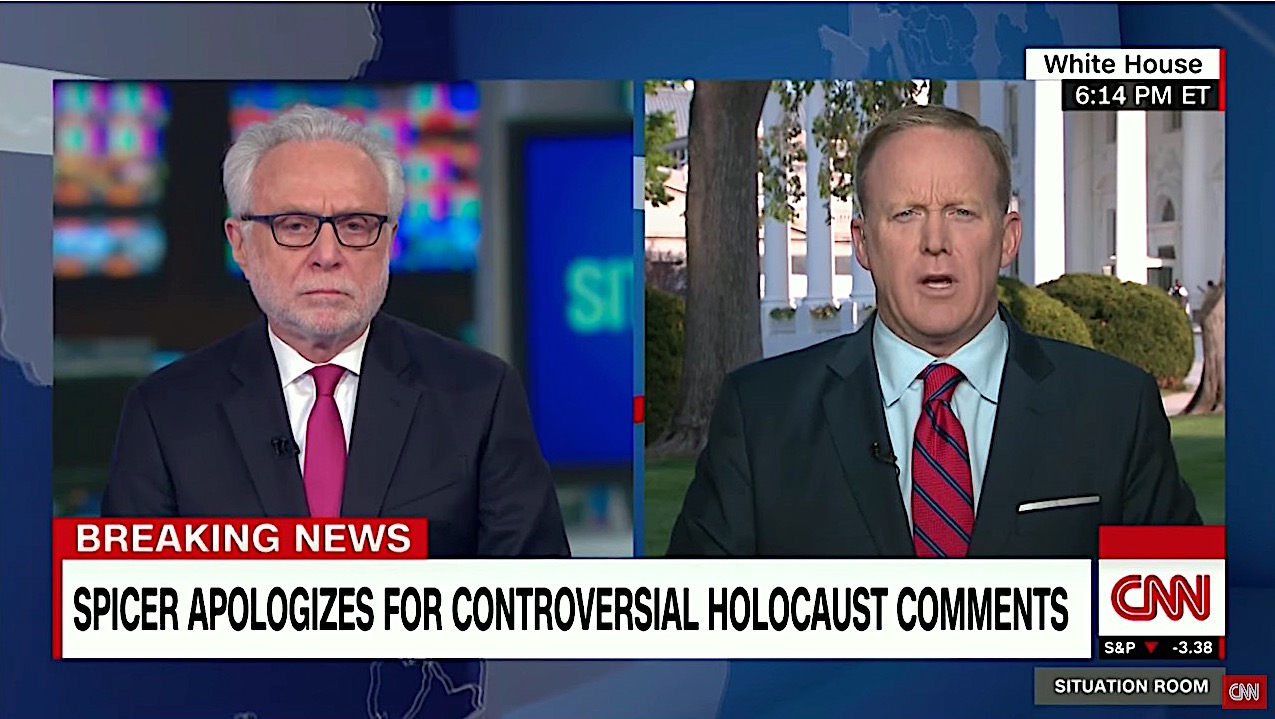Watch Sean Spicer verbally fumble his way through an apology for his Hitler and Holocaust blunder


A free daily email with the biggest news stories of the day – and the best features from TheWeek.com
You are now subscribed
Your newsletter sign-up was successful
White House Press Secretary Sean Spicer went way off-script at Tuesday's press briefing, suggesting that Nazi leader Adolf Hitler wasn't as bad as Syrian leader Bashar al-Assad and had not used chemical weapons or gassed "his own people," among other offensive and ahistorical flubs.
Spicer tried to be relentlessly on-message when he went on CNN to apologize Tuesday evening. "Frankly, I mistakenly made an inappropriate and insensitive reference to the Holocaust, for which, frankly, there is no comparison," Spicer told Wolf Blitzer. "And for that I apologize. It was a mistake to do that." Blitzer asked him who, specifically, he was apologizing to, and Spicer said "anybody who not just how suffered in the Holocaust or is a descendent of anybody but frankly, anyone who was offended by those comments." The apology went on in that vein for 4 minutes, until Blitzer said, "I think it's very important that you came out to formally apologize," and moved on to Syria.
But the long apology had its share of malapropisms and head-scratchers, too. "I'm not going to try to quantify it, Wolf, it was a mistake," Spicer said at one point, apparently meaning "qualify." At another point he said "the intelligence community continues to evolve the situation on the ground." And he said he felt it necessary to come on TV to apologize "to make sure that I clarified and was not in any way shape or form any more of a distraction from the president's decisive action in Syria and the attempts that he's making to destabilize the region" — which would probably be news to Trump.
The Week
Escape your echo chamber. Get the facts behind the news, plus analysis from multiple perspectives.

Sign up for The Week's Free Newsletters
From our morning news briefing to a weekly Good News Newsletter, get the best of The Week delivered directly to your inbox.
From our morning news briefing to a weekly Good News Newsletter, get the best of The Week delivered directly to your inbox.
Blitzer ended by noting that this wasn't Spicer's first blunder at the lectern. "Are you worried, Sean, that you have a credibility problem right now?" he asked. "No, I think this is why I'm here right now, Wolf," Spicer said. It's not clear if the subtle dig at CNN was intentional or just a lucky mistake.
A free daily email with the biggest news stories of the day – and the best features from TheWeek.com
Peter has worked as a news and culture writer and editor at The Week since the site's launch in 2008. He covers politics, world affairs, religion and cultural currents. His journalism career began as a copy editor at a financial newswire and has included editorial positions at The New York Times Magazine, Facts on File, and Oregon State University.
-
 Political cartoons for February 16
Political cartoons for February 16Cartoons Monday’s political cartoons include President's Day, a valentine from the Epstein files, and more
-
 Regent Hong Kong: a tranquil haven with a prime waterfront spot
Regent Hong Kong: a tranquil haven with a prime waterfront spotThe Week Recommends The trendy hotel recently underwent an extensive two-year revamp
-
 The problem with diagnosing profound autism
The problem with diagnosing profound autismThe Explainer Experts are reconsidering the idea of autism as a spectrum, which could impact diagnoses and policy making for the condition
-
 ABC News to pay $15M in Trump defamation suit
ABC News to pay $15M in Trump defamation suitSpeed Read The lawsuit stemmed from George Stephanopoulos' on-air assertion that Trump was found liable for raping writer E. Jean Carroll
-
 Judge blocks Louisiana 10 Commandments law
Judge blocks Louisiana 10 Commandments lawSpeed Read U.S. District Judge John deGravelles ruled that a law ordering schools to display the Ten Commandments in classrooms was unconstitutional
-
 ATF finalizes rule to close 'gun show loophole'
ATF finalizes rule to close 'gun show loophole'Speed Read Biden moves to expand background checks for gun buyers
-
 Hong Kong passes tough new security law
Hong Kong passes tough new security lawSpeed Read It will allow the government to further suppress all forms of dissent
-
 France enshrines abortion rights in constitution
France enshrines abortion rights in constitutionspeed read It became the first country to make abortion a constitutional right
-
 Texas executes man despite contested evidence
Texas executes man despite contested evidenceSpeed Read Texas rejected calls for a rehearing of Ivan Cantu's case amid recanted testimony and allegations of suppressed exculpatory evidence
-
 Supreme Court wary of state social media regulations
Supreme Court wary of state social media regulationsSpeed Read A majority of justices appeared skeptical that Texas and Florida were lawfully protecting the free speech rights of users
-
 Greece legalizes same-sex marriage
Greece legalizes same-sex marriageSpeed Read Greece becomes the first Orthodox Christian country to enshrine marriage equality in law
